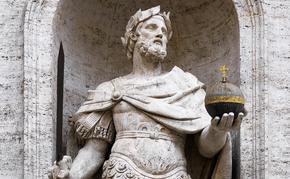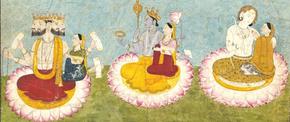The views expressed in our content reflect individual perspectives and do not represent the authoritative views of the Baha'i Faith.
What are you absolutely certain about? We call that assurance in the truth of something “certitude”—confidence in the truth of any important matter.
That may be why one of the most important volumes written by Baha’u’llah, the prophet and founder of the Baha’i Faith, is called The Book of Certitude.
The Book of Certitude asks and then answers these crucial questions: when it comes to someone who claims to be the fulfillment of prophecy, how do you know whether that claim is true or false? Is there a way to test that prophetic claim? If so, by what criteria? By what yardstick? By what standard?
If the warrant of a prophetic claim is whatever is popularly expected, then the truth claim cannot, and will not, measure up. Historically, it never has. The most obvious example occurred at the time of Christ, when the popular expectation was that the Messiah would liberate the Jews from the Roman yoke, under which the sorely oppressed Jews chafed. Liberation from oppression was the social salvation that was expected as the work of the Messiah. But Jesus did not overthrow the Romans. Therefore, under the logic of popular expectation, Jesus could not be the Messiah.
So how is it today that Christianity, the religion that Jesus Christ founded, has come to believe that Jesus indeed was the Messiah? This could only have happened if the popular messianic expectations were subordinated to Jesus’s own teachings about prophecy fulfillment. Basically, Jesus was a spiritual Messiah, offering spiritual salvation and spiritual fulfillment of Jewish prophecies. What was radical then is commonplace now.
So why should anything be different the second time around? Why should popular expectations about the Second Coming of Christ be the standard by which we should judge Baha’u’llah’s messianic claims?
In July 1861, a group of Muslim clergy sent a representative to ask Baha’u’llah to perform a miracle, in proof of his divine wisdom, to which Baha’u’llah replied: “God should test His creatures, and they should not test God.” – Quoted by Shoghi Effendi in God Passes By, p. 144.
Here’s what happened, as Abdu’l-Baha recounted:
It often happened in Baghdad that Muslim, Jewish, and Christian divines and European men of learning would be gathered in [Baha’u’llah’s] blessed presence. They would each ask a different question and, despite their varying beliefs, would each receive so complete and convincing a reply as to be fully satisfied. Even the Persian divines residing in Karbila and Najaf chose a learned man by the name of Mulla Ḥasan Amu and dispatched him as their representative. He came into His blessed presence and asked a number of questions on their behalf, to which Baha’u’llah responded.
He then said, “The divines fully recognize the extent of your knowledge and attainments, and it is acknowledged by all that you are without peer or equal in every field of learning. It is moreover evident that you have never studied or acquired this learning. But the divines say that they are not satisfied with this and cannot acknowledge the truth of your claim on the basis of your knowledge and attainments alone. They therefore ask you to produce a miracle in order to satisfy and assure their hearts.”
Baha’u’llah replied, “Although they have no right to ask this, since it is for God to test His creatures and not for them to test God, yet their request is in this case accepted and allowed. But the Cause of God is not a theatrical stage where every hour a new performance may be offered and every day a new demand presented. For otherwise the Cause of God would become the plaything of children.
“Let the divines, therefore, assemble and choose unanimously one miracle, and let them stipulate in writing that once it has been performed they will no longer entertain any doubt, but will all acknowledge and confess the truth of this Cause. Let them seal that paper and bring it to Me. They must fix this as the criterion of truth: If it be performed, they should have no remaining doubt; and if not, We shall stand convicted of imposture.”
That learned man arose and replied, “There is no more to be said.” He kissed Baha’u’llah’s knee, even though he was not a believer, and departed. Then he gathered the divines and conveyed Baha’u’llah’s message. They consulted together and said, “This man is a magician; perchance he will perform some enchantment, and then we will have no recourse”, and so they dared not respond. – Abdu’l-Baha, Some Answered Questions, newly revised edition, pp. 34-35.
History did not record the identities of those “European men of learning” who “often” would “be gathered in His blessed presence.” In this fascinating episode, the Muslim clergy themselves assembled, consulted and agreed to send a representative to demand that Baha’u’llah perform a miracle as absolute proof of his spiritual credentials and of the truth of the Bab’s mission. Baha’u’llah accepted this request, but conditioned it on agreement by the clergy as to what the miracle they wished him to perform. This the clergy were unable to do, for fear that Baha’u’llah might actually have had the power to accomplish that miracle, which, accomplished, would leave no choice but to believe in Baha’u’llah’s spiritual authority and in the Babi religion, which evolved, over time, into the Baha’i Faith.
Although he accepted this request, Baha’u’llah, in The Book of Certitude, explained that prophecies themselves are a litmus test of spiritual purity and perceptivity:
Know verily that the purpose underlying all these symbolic terms and abstruse allusions, which emanate from the Revealers of God’s holy Cause, hath been to test and prove the peoples of the world; that thereby the earth of the pure and illuminated hearts may be known from the perishable and barren soil. From time immemorial such hath been the way of God amidst His creatures, and to this testify the records of the sacred books. – Baha’u’llah, The Book of Certitude, p. 49.
Put another way, prophecies do not test the truth of Baha’u’llah’s claims, but rather the prophecies themselves test the spiritual purity of those seekers who investigate the Baha’i teachings. Let’s look at just one of those claims, proclaimed in what is often referred to as Baha’u’llah’s “Tablet to the Christians”:
Say, O followers of the Son! Have ye shut out yourselves from Me by reason of My Name? … We, verily, have come for your sakes, and have borne the misfortunes of the world for your salvation. … Open the doors of your hearts. He Who is the Spirit verily standeth before them.
Announce thou unto the priests: … Verily, He Who is the Spirit of Truth is come to guide you unto all truth. … Say, this is the One Who hath glorified the Son and hath exalted His Cause. … Blessed the soul that hath been raised to life through My quickening breath and hath gained admittance into My heavenly Kingdom. – Baha’u’llah, Summons of the Lord of Hosts, pp. 9, 12, 16.
So is Baha’u’llah the Spirit of Truth foretold by Christ, as he claimed? This is a matter of faith, pure and simple. Only you can decide for yourself. Just keep in mind Baha’u’llah’s teaching that prophecies are a test of spiritual receptivity and insight. The prophecies themselves do not measure Baha’u’llah. They measure the receptivity of the hearer.

















Comments
Sign in or create an account
Continue with Facebookor